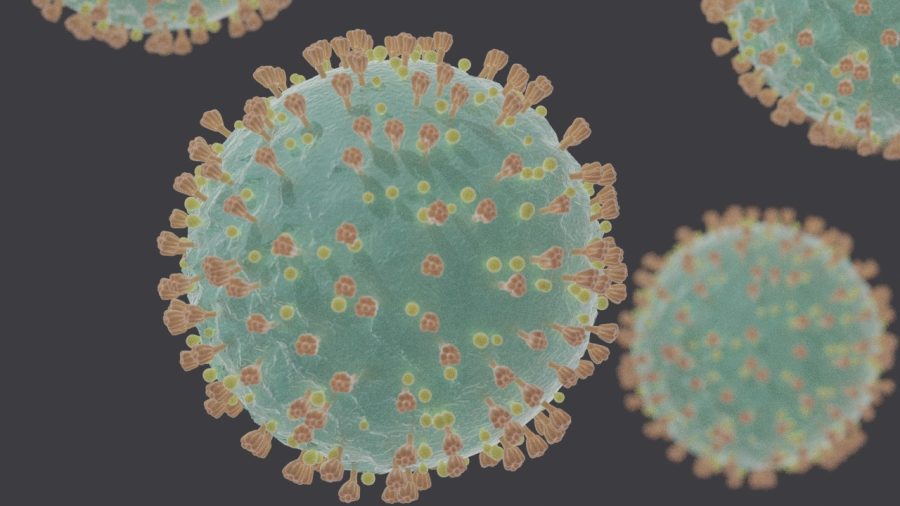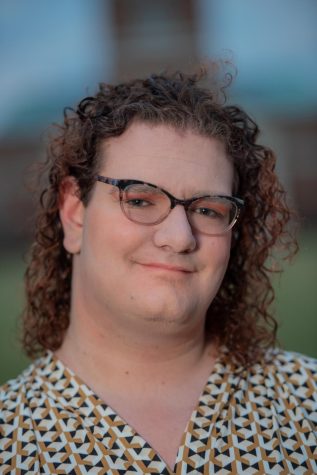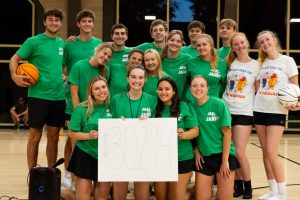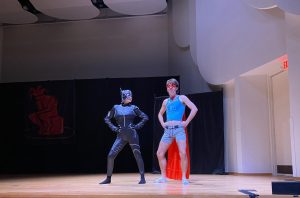University does not plan for COVID-19 dashboard to return
Last week, cases rose to a high of about 95; as of Monday, the number was down to 30
As of Monday night, the university has 30 active cases of COVID-19.
September 7, 2022
The university has disabled the COVID-19 case dashboard; however, the Old Gold & Black has confirmed that Student Health Services (SHS) has reported 30 current active cases as of Monday night, according to Vice President for Campus Life Dr. Shea Kidd Brown.
The 30 active cases are a decrease from last week, during which there was a peak of about 95 active cases. Since Aug. 17, 207 cases have been reported, according to Kidd Brown, compared with 316 cases this time during the spring 2022 semester. The active case numbers represent cases across all of Wake Forest’s undergraduate and postgraduate schools except for the medical school. Kidd Brown also noted that the actual case count may be higher because SHS, who is tracking cases, says their numbers are less reliable since some students are self-testing or not reporting to SHS.
Kidd Brown explained that, in the administration’s view, the number of positive cases no longer serves as a useful metric as the university shifts from viewing COVID-19 as a pandemic to an endemic.
“Due to changes in testing, reporting, contact tracing and the reduced severity of the disease among a highly vaccinated community, the number of positive cases is no longer a useful indicator of the overall health of our campus,” Kidd Brown said. “The dashboard previously served as a tool when we were managing a crisis. As COVID-19 becomes endemic, we are embedding care, support and monitoring within existing systems.”
However, the university continues to monitor cases and expects the case count to decline as the semester progresses.
“We are closely monitoring cases that emerge from testing at Student Health Services as well as those that are reported to us by students,” Director of Student Health Services Dr. Cecil Price said. “We saw an increase over the first couple weeks of classes, which was anticipated, and we expect cases to decline as we enter the fall season.”
Sophomore Icy Zhang reported having COVID-19 symptoms to Student Health during the first week of class. Zhang expressed how she has received little support from the university.
“I feel like the support is limited especially when they are largely dependent on the students and their friends themselves,” Zhang said. “The most important resource I would like from the university is the self-test kits for when I was having a hard time getting up from bed and walking to the Wellbeing Center, which the university advised me to do.”
Dr. Dan Locklair is a professor of music at Wake Forest and has had students miss his class due to being sick with COVID-19. Lately, he has also noticed more students wearing their masks to class because of the surge. Locklair expressed that the university has done a respectable job so far in their pandemic response, but he is unsure why the university chose to remove the dashboard.
“It was a useful tool over the pandemic period just to simply see what our condition was here, but I’m not sure what the thinking was behind it,” Locklair said. “I only have to think ‘well, they’ve certainly been on top of everything else in the past and done it right.’ There must have been a good reason to do away with it.”
He continued: “It’s always handy for people to have barometers to see. Of course, if the information that the barometer is giving you is not accurate, then it’s kind of like getting a phony weather forecast.”
The university has a limited number of private rooms available for isolation and are reserving those rooms for the most vulnerable. Most students who contract COVID-19 are not removed from their living spaces.
“We are approaching our isolation protocols this fall in much the same way a household would provide support to a family member with an illness,” Assistant Vice President for Campus Life and Dean of Residence Life and Housing Matt Clifford said. “Roommates who are living with a student who has tested positive for COVID-19 can protect themselves by staying current with recommended vaccines and wearing a well-fitting mask when together.”
The surge in cases has affected different campus organizations. The theater department is one of them. The COVID-19 outbreak poses challenges to the department as they prepare for the first show of the season, “This Girl Laughs, This Girl Cries, This Girl Does Nothing”.
Before rehearsal on Aug. 30 — two weeks from the opening night — several people involved with the production tested positive for COVID-19. According to Davis, the department asked Student Health Services if there were any protocols to follow during an outbreak within a population on campus, they were told there was none, since the university had shifted to treating COVID-19 like an endemic.
“The challenge is twofold,” Brook Davis, Professor of Acting and the production’s director, said. “I want to keep everyone as safe as possible during the rehearsal process, but I also have a time crunch with opening night right around the corner.”
For the past week, the production team has been required to test for COVID-19 before rehearsal and wear a mask at all times when not present on stage. The cast is rehearsing on the patio outside Scales Art Center until they resume normal rehearsal on Sept. 5.
“I think everyone is struggling to figure out what the best practices are right now,” Davis said. “It’s a real challenge to figure out what we should be doing at this particular time. I’m sure the university is struggling with it as well. ”
The rise in cases is not isolated to Wake Forest’s campus either. The Winston-Salem Journal reported that the Center for Disease Control and Prevention (CDC) has categorized Forsyth County COVID-19 levels as high. The CDC recommendation for counties with high levels is masks in indoor public spaces, as well as public transportation, regardless of vaccination status.
“The good news is we know how to navigate this,” Kidd Brown said. “Each of us has experienced the pandemic in unique and similar ways for more than two years. As a campus community, the strategies we have used during this period have been very effective, and with continued teamwork and partnerships, we will keep the health of our campus at the center. I encourage students to practice self-care while remaining mindful of the greater campus community as we work to keep one another healthy.”
University officials still urge students to take preventative measures like hand-washing and masking if that makes the students feel more comfortable. Chris Ohl, an infectious disease specialist at Wake Forest Baptist Hospital and COVID-19 advisor to Wake Forest, encourages students to also stay up to date on vaccinations.
“A vaccine booster that targets the current circulating variants BA.4 and BA.5 will become available the third week of September,” Ohl said. “This booster has considerably greater immune activity against these variants which will likely still predominate as we go through the fall and winter viral season. All people are encouraged to get boosted this fall.”
BA.4 and BA.5 are sub-variants of Omicron which has been classified by the Center for Disease Control and Prevention (CDC) as a “variant of concern”, meaning there is evidence of an increase in transmissibility and severity. Antibodies generated by previous infection and vaccinations are also less effective against variants of concern.
Students with COVID-19 concerns, whether that be symptoms, a positive test or general questions should visit the Student Health Service COVID website and the isolation website for more information.
Correction Sept. 7, 2022: The subhead of the article was modified slightly to reflect that 95 is an estimate.
Update Sept. 8, 2022: The article’s headline was updated to match the headline in print.

















